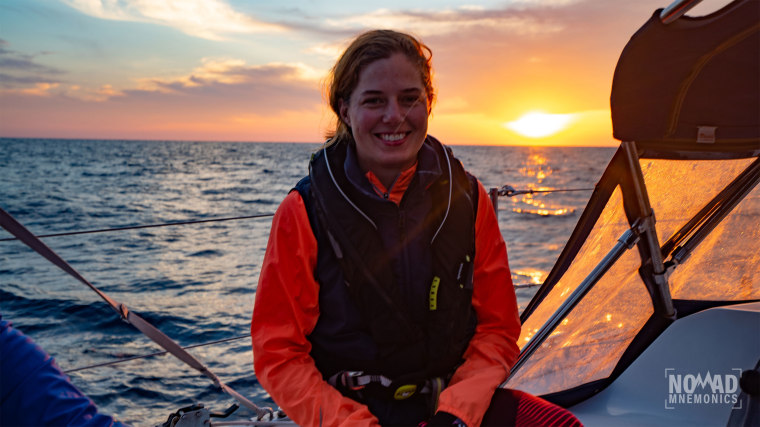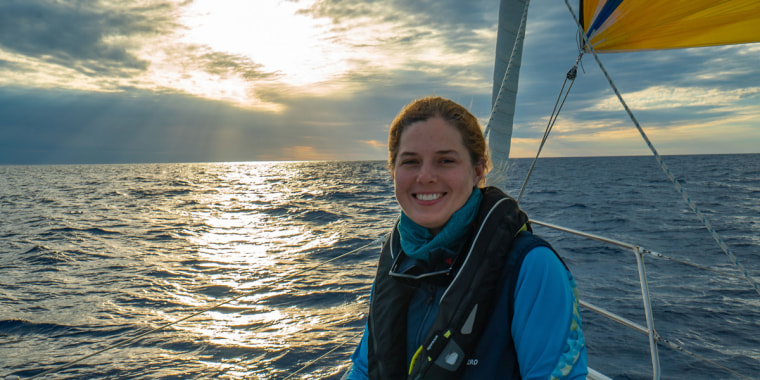In all the history books about ocean explorers, there isn’t anything quite like eXXpedition: the first all-women’s environmental mission set to sail around the world.
Founded by environmentalist and scientist Emily Penn, eXXpedition will embark on its first global mission on Oct. 8 from Plymouth, U.K. and sail around the world tracking plastic in the oceans. About 300 women will join between 30 different legs of the voyage, which vary in length and intensity. In a 73-foot steel boat, the women will voyage to four oceanic gyres, which are places on earth where the currents collect plastic in alarming amounts.
The voyagers, aged 18 to 57 from 30 nationalities, will collect and survey samples of microplastics, which are plastic fragments not always seen by the naked eye. The mission is to better understand the sources of pollution, rather than try to clean it up right away.
“Trying to clean up five trillion fragments of plastic on the surface of the ocean, and many times they’ve sunk to the depths. It’s an enormous challenge,” Penn said in an interview with Know Your Value. “Our opportunity is working at the source to stop any more plastic from coming in and to identify which industry, which countries is it coming from?”

Women of any background can sign up for an eXXpedition leg. An experienced crew mans the boat, while other women cook, clean, photograph, write, film and more. Everyone from business managers to actors are joining the upcoming journey. All of those on board receive sailing training and play an active part of the sample collection process. About 10,000 women applied to be a part of October’s expedition, according to Penn.
“We need scientists, government leaders, filmmakers, storytellers, we need problem solvers, we need policymakers, industry leaders,” said Penn. “Mostly right now we need them to understand the problem. The best way is to have them take all of that knowledge and experience back home, and carry those solutions back to that community.”
Crew member Marcia Reinauer is a documentary filmmaker and offshore sailor who will be joining eXXpedition and heading for the mid-Atlantic Azores next week. She will also document the journey on film.
“I’ve been boating and sailing my entire life, and it’s very much a man’s world,” said Reinauer in an interview with Know Your Value. “During the 35 years I have been a waterwoman, I have observed a drastic deterioration of our waterways ... Women speak on more of an emotional level, and sometimes that emotion combined with science can be really impactful.”
During her years as a researcher, Penn wondered how much of the plastic in the ocean was winding up in the food chain. She took a blood test and found that her own body contained 29 out of 35 toxic chemicals that are found on plastics, including flourinated compounds, which make objects fire-proof, and phthalates, which make plastic more flexible. These chemicals can be cancerous or create serious hormonal problems during pregnancy. They can also be passed onto our children.
The eXXpedition’s all-woman concept (and the two XX’s in the name as a reference to women’s chromosomes) started for purely scientific reasons. As plastics make their way into our food sources, pregnancy is becoming more risky, according to Penn. She thought it was critical to involve women in sample collecting in order to get the word out.
“The levels of chemicals that we have in our bodies — they aren’t alarmingly high, but the fact that we’re getting these chemicals inside of us, and pollution seems to be getting worse —It’s a scary prospect for our future,” Penn said.
Penn launched the eXXpedition series in 2014, and has sailed 11 voyages everywhere from the North Atlantic to Hawaii. Over time, Penn realized that the all-women concept was more powerful than data collection.
“What’s made me stick at it over the years is feeling how powerful these voyages are, and how the women bond is different than on a mixed voyage,” said Penn. “People are more willing to be vulnerable, drop their guard, and form those bonds faster, and those bonds last for life.”
